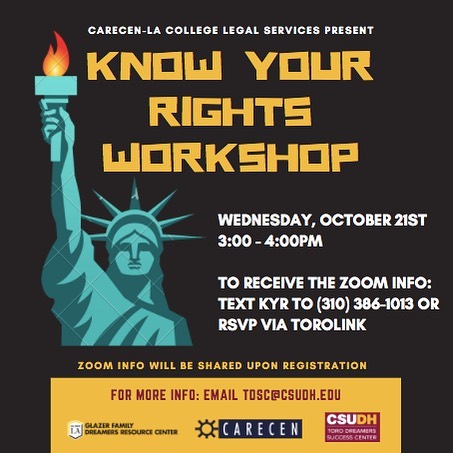Flyer for Oct. 21 Workshop for Undocumented Students. Courtesy of CSUDH Toros Dreamers Success Center.
By Carlos Martinez, Web Editor
Immigration has been a hot topic in politics for decades. As the 2020 general election draws to a close, many are worried about the fate of programs such as the Deferred Action for Childhood Arrivals policy and the DREAM Act.
To keep the community informed, the CSUDH Toro Dreamers Success Center hosted a virtual workshop on Oct. 21 to inform students and faculty about the rights of undocumented and mixed families, which number about 500 at this campus, and about 9,500 throughout the CSU system.
For the workshop, the TDSC collaborated with California State University’s Glazer Family Dreamers Resource Center to introduce participants to the legal services that are freely available to CSU students, staff, faculty and their immediate families.
According to Ana Barragan, program director for the TDSC, the 23 CSU campuses are mandated to provide legal services for students, such as CSUDH’s partnership with the Central American Resource Center. (CARECEN).
CARECEN is the largest Central American rights non-profit organization in the United States. According to its website, CARECEN empowers all immigrants by defending human and civil rights and working for social and economic justice while promoting cultural diversity.
Michelle Polanco, a staff attorney from CARECEN who serves both CSULA and CSUDH, elaborated on resources available to students and staff if they were to encounter ICE, such as the organization’s deportation defense unit.
“It’s very important to stay calm and have your phone ready for any video or picture evidence,” Polanco said. “It’s good to prepare yourself for an emergency scenario.”
Polanco also provided tips on how to handle an encounter with an ICE agent. One important step is to see a warrant signed by a judge if ICE agents are asking for entry to your home.
If there is no signature or if the information on the warrant is incorrect such as the address of the person listed, you don’t have to open the door.
You have the right to plead the Fifth Amendment and choose to remain silent, even if the agent has a warrant and you have to let them into your home.
If you are detained, establish a plan to handle aspects such as child care, bills, wiring money and remembering phone numbers such as family members and lawyers.
When asked about the 2020 election’s possible effects on legal services, Polanco said, “We can’t predict the future due to many factors. Either way, people should still seek consultation and encourage students to tell others, who might be in legal issues, about these services.”
The Toros Dreamers Success Center has a goal of holding at least four “Know Your Rights” workshops per semester, the number of workshops varies on need and demand as well as legal services and conversations.
“We take a holistic approach and provide students with information about the services available,” Barragan said. “Such as social media campaigns, training and consultations.”
Typically workshops are arranged to share about immigration services in the middle of the semester and focus on preparing for the worst-case scenario such as leaving behind all assets.
“We make sure to mention websites on the page that provide other types of services such as DACA renewals and help with the DREAM act,” Barragan said.
The Toros Dreamers Success Center will collaborate with CARECEN in a “Family First Plan” workshop on Nov.18 from 6-7 p.m. in Spanish and Nov. 19 from 6-7 p.m. in English.
For more information on legal services contact the Toros Dreamers Success Center at (310) 243-2782 or [email protected].
In addition, students can also call CARECEN for an initial consultation at 213-385-7800 or access their legal services page.

